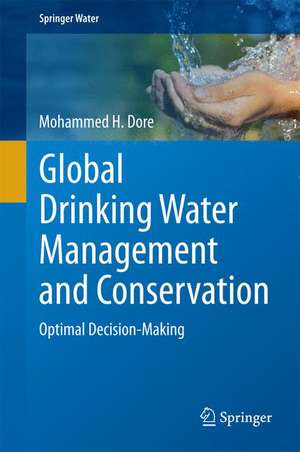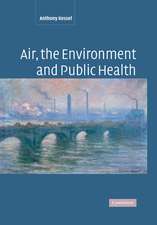Global Drinking Water Management and Conservation: Optimal Decision-Making: Springer Water
Autor Mohammed H. Doreen Limba Engleză Hardback – 10 oct 2014
| Toate formatele și edițiile | Preț | Express |
|---|---|---|
| Paperback (1) | 641.71 lei 43-57 zile | |
| Springer International Publishing – 10 sep 2016 | 641.71 lei 43-57 zile | |
| Hardback (1) | 648.05 lei 43-57 zile | |
| Springer International Publishing – 10 oct 2014 | 648.05 lei 43-57 zile |
Din seria Springer Water
- 18%
 Preț: 896.08 lei
Preț: 896.08 lei - 18%
 Preț: 956.03 lei
Preț: 956.03 lei - 24%
 Preț: 2377.21 lei
Preț: 2377.21 lei - 15%
 Preț: 653.14 lei
Preț: 653.14 lei -
 Preț: 361.56 lei
Preț: 361.56 lei - 18%
 Preț: 1877.02 lei
Preț: 1877.02 lei - 18%
 Preț: 1113.09 lei
Preț: 1113.09 lei - 18%
 Preț: 915.79 lei
Preț: 915.79 lei - 15%
 Preț: 659.70 lei
Preț: 659.70 lei - 15%
 Preț: 649.71 lei
Preț: 649.71 lei - 15%
 Preț: 648.42 lei
Preț: 648.42 lei - 15%
 Preț: 652.49 lei
Preț: 652.49 lei - 18%
 Preț: 960.78 lei
Preț: 960.78 lei - 18%
 Preț: 787.78 lei
Preț: 787.78 lei -
 Preț: 391.99 lei
Preț: 391.99 lei - 18%
 Preț: 949.55 lei
Preț: 949.55 lei - 18%
 Preț: 1005.29 lei
Preț: 1005.29 lei - 15%
 Preț: 646.75 lei
Preț: 646.75 lei - 15%
 Preț: 649.22 lei
Preț: 649.22 lei - 18%
 Preț: 791.71 lei
Preț: 791.71 lei - 15%
 Preț: 646.43 lei
Preț: 646.43 lei - 18%
 Preț: 903.17 lei
Preț: 903.17 lei - 18%
 Preț: 1234.77 lei
Preț: 1234.77 lei - 15%
 Preț: 649.06 lei
Preț: 649.06 lei - 15%
 Preț: 661.97 lei
Preț: 661.97 lei - 18%
 Preț: 974.04 lei
Preț: 974.04 lei - 15%
 Preț: 650.86 lei
Preț: 650.86 lei - 18%
 Preț: 977.80 lei
Preț: 977.80 lei - 15%
 Preț: 665.08 lei
Preț: 665.08 lei - 18%
 Preț: 948.79 lei
Preț: 948.79 lei - 18%
 Preț: 952.72 lei
Preț: 952.72 lei - 24%
 Preț: 698.86 lei
Preț: 698.86 lei - 15%
 Preț: 647.73 lei
Preț: 647.73 lei - 15%
 Preț: 638.76 lei
Preț: 638.76 lei - 18%
 Preț: 785.42 lei
Preț: 785.42 lei - 15%
 Preț: 645.28 lei
Preț: 645.28 lei - 15%
 Preț: 640.88 lei
Preț: 640.88 lei
Preț: 648.05 lei
Preț vechi: 762.42 lei
-15% Nou
Puncte Express: 972
Preț estimativ în valută:
124.04€ • 134.78$ • 104.26£
124.04€ • 134.78$ • 104.26£
Carte tipărită la comandă
Livrare economică 21 aprilie-05 mai
Preluare comenzi: 021 569.72.76
Specificații
ISBN-13: 9783319110318
ISBN-10: 3319110314
Pagini: 400
Ilustrații: XVIII, 303 p. 88 illus., 73 illus. in color.
Dimensiuni: 155 x 235 x 25 mm
Greutate: 0.63 kg
Ediția:2015
Editura: Springer International Publishing
Colecția Springer
Seria Springer Water
Locul publicării:Cham, Switzerland
ISBN-10: 3319110314
Pagini: 400
Ilustrații: XVIII, 303 p. 88 illus., 73 illus. in color.
Dimensiuni: 155 x 235 x 25 mm
Greutate: 0.63 kg
Ediția:2015
Editura: Springer International Publishing
Colecția Springer
Seria Springer Water
Locul publicării:Cham, Switzerland
Public țintă
ResearchNotă biografică
Mohammed Dore, who did his doctorate at the University of Oxford, UK, came to Brock University in 1981. He has received a number of research grants from the Social Sciences and Humanities Research Council of Canada, the National Science and Engineering Research Council of Canada, the Network Centre of Excellence in Canada, and the US National Science Foundation. With external funding he established his Climate Change Laboratory in 1996. The twin emphasis of his Lab has been training students to carry out high level policy oriented research that not only led to a number of theses but also to reports for various stakeholders who could implement the policy prescriptions. His research on climate change led him to drinking water policy issues. He has also worked as a consultant to both industry and government agencies; for example he has been hired as a contract consultant by Bell Canada; Environment Canada; Natural Resources Canada; The Municipality of Niagara; and the Capital Region District of Greater Victoria.
Textul de pe ultima copertă
This book discusses different drinking water treatment technologies and what contaminants each treatment method can remove, and at what costs. The production of drinking water requires adequate management. This book attempts to fill the existing knowlegde gap about (a) water treatment technologies and their costs, (b) risk assessment methods, (c) adverse health effects of chemical contaminants, (d) management protocols, and varying regulatory practices in different jurisdictions, and what successes are possible even with small financial outlays. Addressing water consulting engineers, politicians, water managers, ecosystem and environmental activists, and water policy researchers, and being clearly structured through a division in four parts, this book considers theoretical aspects, technologies, chemical contaminants and their possible elimination, and illustrates all aspects in selected international case studies.
Source-water protection, water treatment technology, and the water distribution network are critically reviewed and discussed. The book suggests improvements for the management of risks and financial viability of the treatment infrastructure, as well as ways toward an optimal management of the distribution network through the risk-based management of all infrastructure assets.
Source-water protection, water treatment technology, and the water distribution network are critically reviewed and discussed. The book suggests improvements for the management of risks and financial viability of the treatment infrastructure, as well as ways toward an optimal management of the distribution network through the risk-based management of all infrastructure assets.
Caracteristici
Fills knowledge gaps about water treatment technologies and their costs, risk assessment methods, adverse health effects of chemical contamination, and management protocols Suggests improvements for the management of risks and financial viability of the treatment infrastructure, for a better and more healthy drinking water supply for all Offers a comparative classification of water treatment technologies and what contaminants they can remove Includes supplementary material: sn.pub/extras










